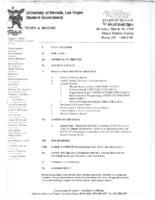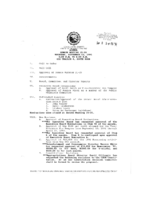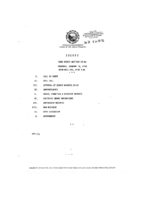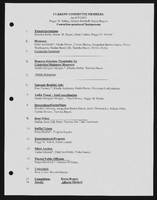Search the Special Collections and Archives Portal
Search Results

Transcript of a narrative by Lucile Bunker, March 10, 1977
Date
Archival Collection
Description
Text

Meeting minutes for Consolidated Student Senate, University of Nevada, Las Vegas, January 3, 1984
Date
Archival Collection
Description
Text

Sanje Sedera oral history interview: transcript
Date
Archival Collection
Description
Oral history interview with Sanje Sedera conducted by Kristel Peralta, Cecilia Winchell, Ayrton Yamaguchi, and Stefani Evans on April 16, 2021 for Reflections: The Las Vegas Asian American and Pacific Islander Oral History Project. Sanje Sedera discusses growing up in Sri Lanka, formerly Ceylon, with his family. He shares his educational history, moving from Sri Lanka to Darwin, Northern Territory, Australia as a high schooler to learn English before immigrating to the United States to attend Idaho State University. Sedera discusses the political unrest and civil war that took place in Sri Lanka between the Tamil and Sinhalese people, and how he grew to appreciate political activism instilled in him by his paternal grandparents. Sedera shares his employment history working as a manager for K-Mart, an opportunity that brought him to Las Vegas, as well as his entrepreneurial pursuits of owning a mortgage business and becoming a realtor. He talks about the financial crisis of 2008 that led to losing his business, his attempts to run for public office, and how he helped to form Nevada's Asian American Democratic Caucus. Sedera concludes with a discussion of his Buddhist practice and how these philosophies have shaped his life.
Text

Transcript of Interview with Michael Drakulich by Jane Finfrock, May 8, 1979
Date
Archival Collection
Description
Text

Meeting minutes for Consolidated Student Senate University of Nevada, Las Vegas, March 16, 1998
Date
Archival Collection
Description
Text

Meeting minutes for Consolidated Student Senate University of Nevada, Las Vegas, September 12, 1991
Date
Archival Collection
Description
Text

Meeting minutes for Consolidated Student Senate University of Nevada, Las Vegas, January 18, 1990
Date
Archival Collection
Description
Text

Meeting minutes for Consolidated Student Senate University of Nevada, Las Vegas, March 27, 1984
Date
Archival Collection
Description
Text

Alpha Kappa Alpha Sorority, Theta Theta Omega Chapter committee chairs and members list
Date
Archival Collection
Description
From the Alpha Kappa Alpha Sorority, Incorporated, Theta Theta Omega Chapter Records (MS-01014) -- Chapter records file.
Text

Charles Scott Emerson oral history interview: transcript
Date
Archival Collection
Description
Oral history interview with Charles Scott Emerson conducted by Claytee D. White on December 21, 2017 for the Remembering 1 October Oral History Project. In this interview, Charles Scott Emerson discusses his work with the American Red Cross and the disaster relief the organization provided during the aftermath of the October 2017 mass shooting in Las Vegas, Nevada. The interview begins with a discussion on Emerson's early life and career in Missouri and how he moved to Las Vegas in 2004. Emerson talks about the American Red Cross response plans and coordinated operations that are in place for when the community is faced with a disaster, going into specific detail on the community-wide response to the October 1, 2017 shooting. He gives a behind-the-scenes glimpse into how relief work is organized, using this interview as a chance to praise the hidden heroes of the October 2017 tragedy, including the people at the Family Assistance Center, the Attorney General's Office, the Driver's License Bureau, and the Coroner's Office, as well as mental health providers, child care workers, blood donors, and more. Throughout the interview, Emerson puts special emphasis on the importance of community in order to offer support in the aftermath of a tragedy as well as to prevent a man-made tragedy from occurring again.
Text
